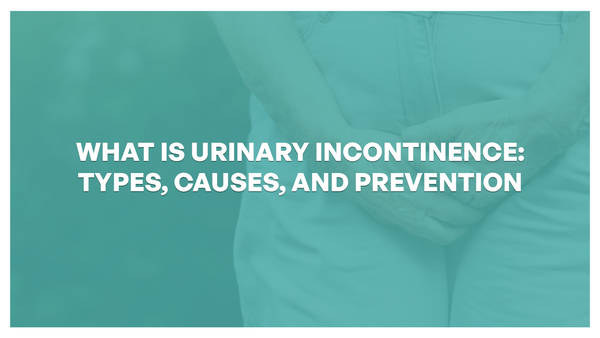What Is Urinary Incontinence: Types, Causes, And Prevention
20th Dec 2023
Urinary incontinence refers to a person's inability to control urination. It is a widespread problem that affects millions of people of all ages and can range from a minor leak to a complete loss of control. Urinary incontinence, or the inability to control one's bladder, is frequently embarrassing.
The intensity can vary from having a light urge to urinate now and then when you cough or sneeze to having a strong desire to urinate suddenly that prevents you from using the bathroom in time.
Here, we will discuss the causes and treatments of urinary incontinence while also providing pertinent information and resources to aid people in managing their condition, whether they are just starting to experience incontinence or have been dealing with it for years.
Causes Of Urinary Incontinence
The many causes of the urinary incontinence are:
- Weak pelvic floor muscles
- Nerve Damage
- Childbirth
- obesity
- medications
- Pregnancy
- Urinary tract infection
- Kidney stones
- Bladder retraction
- Neurological conditions such as multiple sclerosis or stroke
- Prostate enlargement Recurrent diarrhea
- Consequences of some cancer treatments, such as persistent coughing
- Cystitis inters
- titial disease
- Menopause
Types of Urinary Incontinence
The two types of urine incontinence that affect women most frequently are discussed below.
1.Stress-Related Incontinence
The most frequent kind of incontinence is this one. The vast majority of younger women experience incontinence. When the bladder is under stress or strain, stress incontinence happens.
Weak pelvic floor muscles can cause stress incontinence by forcing the bladder and urethra to work harder than necessary. When you have stress incontinence, typical bodily motions like coughing, sneezing, or laughing might make you leak urine. Sudden movements and exercise can also bring on urine leakage.
2.The Urgency of Incontinence
Urine leakage related to urge incontinence typically happens after an intense, unexpected urge to urinate and before you can get to a bathroom. Even when they have access to the restroom right away, some people with urge incontinence need to urinate more than eight times per day.
Additionally, they only urinate a little right after using the restroom. The term "overactive bladder" is sometimes used to describe urge incontinence. The likelihood of urge incontinence is higher in older women. It might happen when you least expect it—while you are sleeping, after you drink water or when you hear or touch running water.
Symptoms of Urinary Incontinence
By itself, urinary incontinence is not a disease. Incontinence in the urine signifies several health issues, most commonly weak pelvic floor muscles. Some women experience other urine symptoms in addition to urinary incontinence.
●pelvic pressure or spasms that cause a strong need to urinate
●Using the restroom more often than usual (more than eight times daily or more than twice at night)
●(Bedwetting) Urinating during the night
Preventing Urinary Incontinence
Sometimes urinary incontinence cannot be avoided but to lessen your risk:
●Maintain a healthy weight.
●Do pelvic floor exercises.
●Avoid bladder irritants such as alcohol, coffee, and acidic foods.
●Extra fiber should be consumed to prevent constipation, which can cause urine incontinence.
●Quit smoking or seek assistance if you already do.
●Use the Bedsore Prevention and Treatment Store to get unique products that will assist incontinence management..
Summary
Urinary incontinence is an underlying condition more common in women than in men. People are generally not vocal about it due to the stigma attached to it's results. The severity varies from an urge to urinate, leakage during sneezing or coughing, and, in several cases, bed wetting.
There are many causes of incontinence, such as a weak bladder, nerve damage, pregnancy, and medical conditions. The good news is you can control it by quitting unhealthy habits such as drinking alcohol and smoking. Regular exercises help, and some medicines and products can prevent embarrassment.

